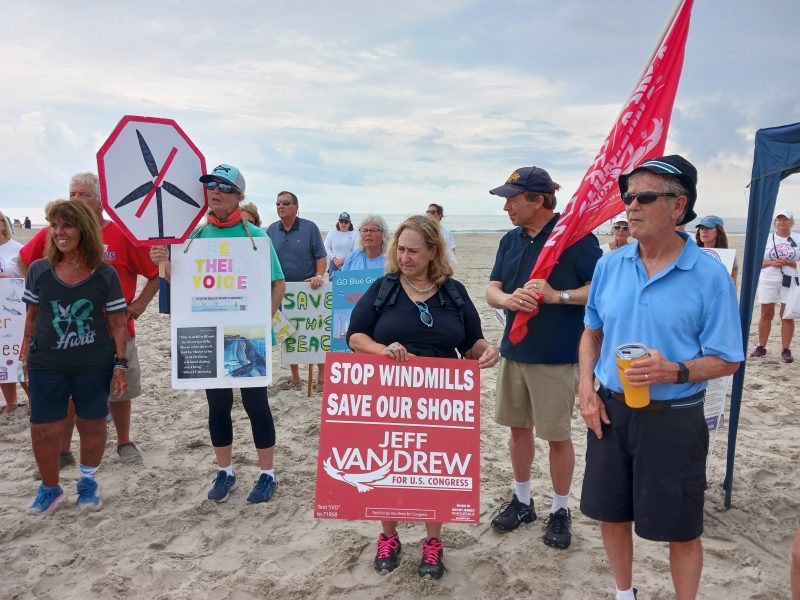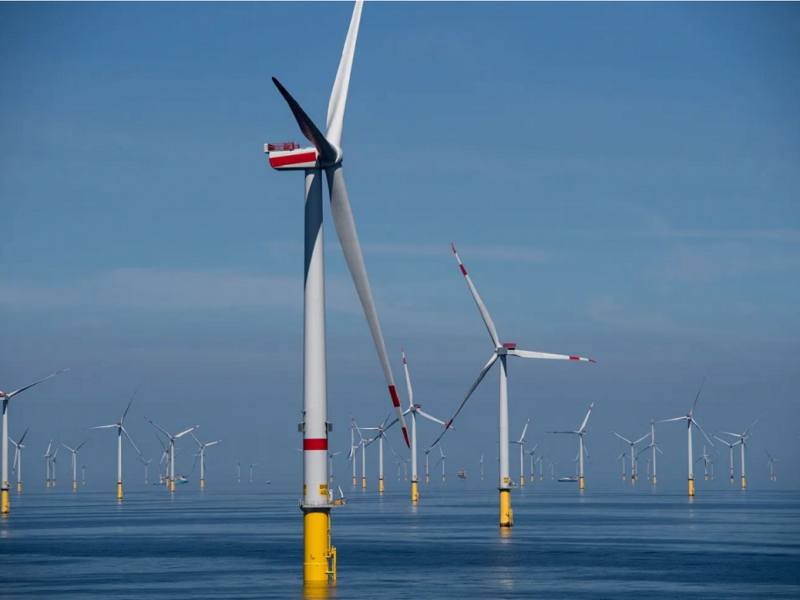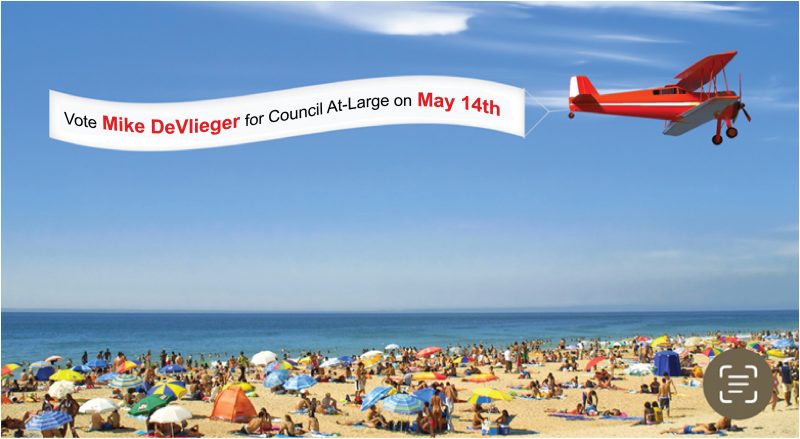During a rally in September, protesters gather on the 35th Street beach in Ocean City to denounce Orsted's then-proposed offshore wind farm.
 New Jersey citizens action groups Defend Brigantine Beach and Downbeach (DBB) and Protect Our Coast New Jersey (POCNJ) filed notices of appeal on Tuesday against the New Jersey Board of Public Utilities (NJBPU) in the state Appellate Court.
The appeals challenge the legality of two recent NJBPU Orders granting Offshore Wind Renewable Energy Certificate (OREC) contracts to offshore wind project developers Attentive Energy LLC and Leading Light Wind LLC, according to a news release.
The contracts entitle Attentive Energy and Leading Light Wind to receive payments averaging more than 15 cents/kwh for 3742 MW of power over 20 years, compared with the 6 cents/kwh wholesale price of power available to state utilities.
The organizations supporting the appeal are represented by attorney Bruce I. Afran of Princeton.
The BPU has conducted its solicitations and award of contracts to offshore wind developers in secrecy with no opportunity for public involvement until they issue a final order. Even then the basis for its decision is hidden from public view with the most critical information redacted from the public record, the release says.
In addition, the analysis from the New Jersey Rate Counsel, who is required to be the Citizen’s Advocate representing the New Jersey ratepayer, was also redacted.
For the first time, the NJBPU is being held to account for these actions and its decisions to approve offshore wind rates that don't comply with the law. The Board continues to ignore its mandate to protect ratepayers in favor of promoting the interest of the offshore wind industry in New Jersey, the release states.
“If these awards are allowed to stand, residents throughout the state could pay up to $20 billion extra for power and see their already high bills increase by up to 20 percent or more," Keith Moore, of Defend Brigantine Beach, said in the release. “Besides the cost to residents, the rate impacts to commercial and industrial users will be severe, up to 25 and 30 percent respectively. Many businesses may have to close under that financial pressure.”
New Jersey citizens action groups Defend Brigantine Beach and Downbeach (DBB) and Protect Our Coast New Jersey (POCNJ) filed notices of appeal on Tuesday against the New Jersey Board of Public Utilities (NJBPU) in the state Appellate Court.
The appeals challenge the legality of two recent NJBPU Orders granting Offshore Wind Renewable Energy Certificate (OREC) contracts to offshore wind project developers Attentive Energy LLC and Leading Light Wind LLC, according to a news release.
The contracts entitle Attentive Energy and Leading Light Wind to receive payments averaging more than 15 cents/kwh for 3742 MW of power over 20 years, compared with the 6 cents/kwh wholesale price of power available to state utilities.
The organizations supporting the appeal are represented by attorney Bruce I. Afran of Princeton.
The BPU has conducted its solicitations and award of contracts to offshore wind developers in secrecy with no opportunity for public involvement until they issue a final order. Even then the basis for its decision is hidden from public view with the most critical information redacted from the public record, the release says.
In addition, the analysis from the New Jersey Rate Counsel, who is required to be the Citizen’s Advocate representing the New Jersey ratepayer, was also redacted.
For the first time, the NJBPU is being held to account for these actions and its decisions to approve offshore wind rates that don't comply with the law. The Board continues to ignore its mandate to protect ratepayers in favor of promoting the interest of the offshore wind industry in New Jersey, the release states.
“If these awards are allowed to stand, residents throughout the state could pay up to $20 billion extra for power and see their already high bills increase by up to 20 percent or more," Keith Moore, of Defend Brigantine Beach, said in the release. “Besides the cost to residents, the rate impacts to commercial and industrial users will be severe, up to 25 and 30 percent respectively. Many businesses may have to close under that financial pressure.”
 This image depicts what the towering wind turbines would have looked like off the South Jersey coast. (Courtesy of Orsted)
According to the release, the BPU violated its own state law which mandates that any increase in rates for offshore wind must be exceeded by economic and environmental benefits to the state.
“Based on what little has been revealed, it is clear that the NJBPU and its consultants have deliberately and improperly chosen to use hypothetical benefits to future global populations from reduced carbon emissions at an extremely high value to justify the exorbitant prices for power from these projects, as it has done previously as well," said Edward O’Donnell of Whitestrand Consulting, who prepared a report in support of the appeal. "This is a clear violation of the law which mandates that consideration of such benefits be confined to the state.”
Robin Shaffer, president of POCNJ added, “New Jersey rate and taxpayers will pay excessively with no discernible benefit. It’s mind boggling that the NJBPU would make this move now, raising rates so significantly at a time when so many New Jersey families are struggling just to make ends meet."
In addition to the higher power costs for offshore wind, the BPU has failed to include over $5 billion in added cost of wind energy onshore transmission upgrades, which will also inflate the wind energy rate increases to even higher levels, the release states.
The economic impacts on the New Jersey fishing industry and the negative effect of the higher rates on the state economy will result in the loss of jobs and lower wages throughout the state for more than 20 years, the grassroots groups allege.
Wind Farm opponents further stated that the economic costs will "far outweigh the benefit of any jobs created by these projects in the state, the substantial majority of which will be temporary during the construction period.”
Regarding the claim that these projects will combat climate change, the Bureau of Ocean Energy Management (BOEM), the federal agency responsible for approving offshore wind projects, has publicly acknowledged that such projects will have a negligible impact on climate change, the release states.
The profits from the higher rates will flow directly to the project developers, which include French firm Total Energie and private equity firms including Blackstone.
“The high price of power paid to the owners of these facilities, together with federal tax credits, will enable them to achieve returns on their investment of more than 20 percent per year," O’Donnell said. "This is well beyond that allowed regulated utilities in New Jersey which is about 9 percent. As a result, the BPU has not achieved a fair balance of financial risk and reward between ratepayers and shareholders, as required by New Jersey state law.”
It is expected that the case will be heard by the appeals court over the coming year, with a decision coming down in late 2024 or early 2025.
Those who are concerned about their significant increases in electricity rates and want further information regarding the economic and environmental damages caused by industrial offshore wind energy can visit
This image depicts what the towering wind turbines would have looked like off the South Jersey coast. (Courtesy of Orsted)
According to the release, the BPU violated its own state law which mandates that any increase in rates for offshore wind must be exceeded by economic and environmental benefits to the state.
“Based on what little has been revealed, it is clear that the NJBPU and its consultants have deliberately and improperly chosen to use hypothetical benefits to future global populations from reduced carbon emissions at an extremely high value to justify the exorbitant prices for power from these projects, as it has done previously as well," said Edward O’Donnell of Whitestrand Consulting, who prepared a report in support of the appeal. "This is a clear violation of the law which mandates that consideration of such benefits be confined to the state.”
Robin Shaffer, president of POCNJ added, “New Jersey rate and taxpayers will pay excessively with no discernible benefit. It’s mind boggling that the NJBPU would make this move now, raising rates so significantly at a time when so many New Jersey families are struggling just to make ends meet."
In addition to the higher power costs for offshore wind, the BPU has failed to include over $5 billion in added cost of wind energy onshore transmission upgrades, which will also inflate the wind energy rate increases to even higher levels, the release states.
The economic impacts on the New Jersey fishing industry and the negative effect of the higher rates on the state economy will result in the loss of jobs and lower wages throughout the state for more than 20 years, the grassroots groups allege.
Wind Farm opponents further stated that the economic costs will "far outweigh the benefit of any jobs created by these projects in the state, the substantial majority of which will be temporary during the construction period.”
Regarding the claim that these projects will combat climate change, the Bureau of Ocean Energy Management (BOEM), the federal agency responsible for approving offshore wind projects, has publicly acknowledged that such projects will have a negligible impact on climate change, the release states.
The profits from the higher rates will flow directly to the project developers, which include French firm Total Energie and private equity firms including Blackstone.
“The high price of power paid to the owners of these facilities, together with federal tax credits, will enable them to achieve returns on their investment of more than 20 percent per year," O’Donnell said. "This is well beyond that allowed regulated utilities in New Jersey which is about 9 percent. As a result, the BPU has not achieved a fair balance of financial risk and reward between ratepayers and shareholders, as required by New Jersey state law.”
It is expected that the case will be heard by the appeals court over the coming year, with a decision coming down in late 2024 or early 2025.
Those who are concerned about their significant increases in electricity rates and want further information regarding the economic and environmental damages caused by industrial offshore wind energy can visit  Paid for by Michael DeVlieger
Paid for by Michael DeVlieger